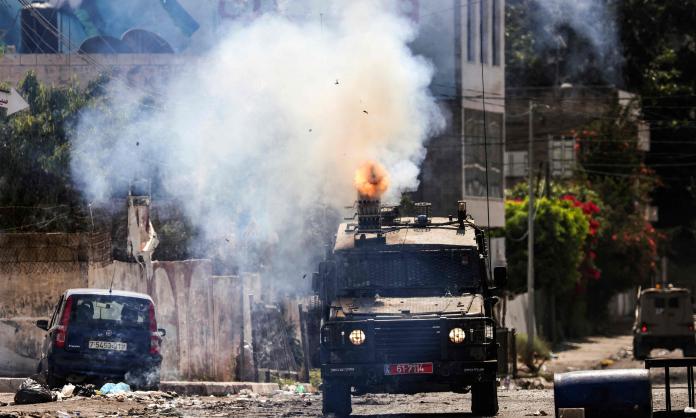“It looked like an earthquake had struck the Jenin camp. The roads were completely obliterated, ambulances could not get through, wounded people had to walk. People inside their homes were crouching down and peeking out from the windows. You could just see the top of people’s heads because they were trying to avoid being shot through the windows.”
Ameed Shahada, a journalist from Al Araby television, was in the Jenin refugee camp when Israeli forces raided the city on Monday morning. His eyewitness account, reported in Middle East Eye, detailed the brutal attack.
Israeli bulldozers ploughed through the Occupied West Bank city, levelling most of the streets surrounding the refugee camp. One thousand soldiers, supported by snipers and drones, targeted civilian infrastructure. Aerial bombardments blew up homes and cut access to water and electricity for hundreds of Palestinians.
The Palestinian Red Crescent Society reported that it had to evacuate 3,000 people from the camp, while many are still trapped inside crumbling homes and underneath rubble. Red Crescent director Ahmed Jebril told the UK charity Medical Aid for Palestine that “ambulances came under direct fire” when trying to enter Jenin to help wounded civilians. The death toll has reportedly risen to ten, with at least 100 wounded.
Last month, Israel carried out airstrikes on Jenin for the first time since 2006. Monday’s offensive has been described as one of the biggest attacks on Jenin in decades. The scale of destruction elicits the memory of Israel’s 2002 attack on the city, in which at least 52 Palestinians were killed.
That attack was a turning point for Jenin. The crowded refugee camp became a symbol of Palestinian resistance. Today, armed grassroots resistance is growing in the West Bank, with militant groups like the Jenin Brigade gaining popularity.
While initially launching defensive operations against military raids, they have shifted to hit and run actions against Israeli soldiers. This has been met with an increase in military repression by the Israelis.
The Israeli government publicly initiated the “Break the Wave campaign” in March last year. This enabled near-daily military raids across the West Bank and resulted in mass arrests. It was the deadliest year for Palestinians since the beginning of the Second Intifada two decades ago. Israeli military violence has continued to escalate, with at least 185 Palestinians killed in the first half of this year.
The dramatic escalation in Israeli violence is also a reflection the broader political dynamics shaping Israeli politics—namely, an insurgent far right. Figures such as Itamar Ben Gvir, a fascist convicted for inciting racial hatred, head Israel’s national security apparatus.
Last week, Ben Gvir addressed a group of settlers atop the illegal outpost of Eviatar, in the West Bank. He called for settlers—illegal colonisers of Palestinian lands—and the military to work together. “We have to settle the land ... and at the same time to launch a military campaign, blow up buildings”, he reportedly said. “Assassinate terrorists. Not one, or two, but dozens, hundreds, or if needed, thousands.”
Politicians such as Ben-Gvir endorse and encourage settler attacks on Palestinians, while the Israeli military facilitates them. Last month, settler gangs ransacked the town of Turmusaya, north of Ramallah, twice in one week, setting fire to at least 30 Palestinian homes. Four hundred settlers stormed the village under the protection of the army. Omar Jabara Abu Al-Qattin, a 25-year-old Palestinian, was killed during the rampage.
The unofficially sanctioned settler violence dovetails with the official colonisation policy of Israel. In mid-June, the government approved plans for more than 5,000 new housing units in the West Bank.
Fascist finance minister and settler leader Bezalel Smotrich was granted sweeping powers to expedite the construction of illegal settlements. He has since vowed to double the settler population in the West Bank and retroactively legalise some illegal outposts.
The government was met with applause from settler leaders. Yisrael Gantz, the head of the Benjamin Regional Council in the West Bank, said that Smotrich’s decision would “turn construction in the settlements into something that is not newsworthy but rather, routine”.
In the face of escalating settler violence, the onslaught of military attacks and mass arrests, Palestinians continue to resist occupation. Hundreds of Palestinians in the besieged Gaza strip held a solidarity rally with Jenin, standing on the fence separating Gaza from Israel.
Shops were shuttered in most areas of the West Bank as Palestinians called for a solidarity strike. Protesters marched in their hundreds in the Deheishe refugee camp in Bethlehem, while smaller demonstrations dotted several neighbourhoods in Occupied East Jerusalem.










